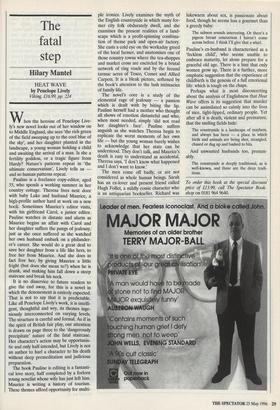The fatal step
Hilary Mantel
HEAT WAVE by Penelope Lively Viking, £16.99, pp. 224 When the heroine of Penelope Live- ly's new novel looks out of her window on to Middle England, she sees 'the rich green of the field sweeping up to the cool blue of the sky', and her daughter planted in the landscape, a young woman holding a child and awaiting the arrival of a man. Is she a fertility goddess, or a tragic figure from Hardy? Nature's patterns repeat in 'the ultimate conservatism', Lively tells us — and so human patterns repeat.
Pauline is a freelance copy-editor, aged 55, who spends a working summer in her country cottage. Theresa lives next door with baby Luke and husband Maurice, a high-profile author hard at work on a new book. Sometimes Maurice's editor visits, with his girlfriend Carol, a junior editor. Pauline watches in distaste and alarm as Maurice begins an affair with Carol and her daughter suffers the pangs of jealousy, just as she once suffered as she watched her own husband embark on a philander- er's career. She would do a great deal to save her daughter from a life like hers, to free her from Maurice. And she does in fact free her, by giving Maurice a little fright (but does she mean to?) when he is drunk, and making him fall down a steep staircase and break his neck.
It is no disservice to future readers to give the end away, for this is a novel in which the denouement is entirely expected. That is not to say that it is predictable. Like all Penelope Lively's work, it is intelli- gent, thoughtful and vviy, its themes inge- niously interconnected on varying levels. The structure is careful and formal. As if in the spirit of British fair play, our attention is drawn on page three to the 'dangerously precipitate' nature of the fatal staircase. Her character's action may be opportunis- tic and only half-intended, but Lively is not an author to hurl a character to his death without deep premeditation and judicious preparation. The book Pauline is editing is a fantasti- cal love story, half completed by a forlorn young novelist whose wife has just left him. Maurice is writing a history of tourism. These themes afford opportunity for multi- ple ironies. Lively examines the myth of the English countryside in which many for- mer city folk obdurately dwell, and she examines the present realities of a land- scape which is a profit-spinning combina- tion of theme park and open-air factory. She casts a cold eye on the workaday greed of the local farmer, and anatomises one of those country towns where the tea-shoppes and market cross are encircled by a brutal network of ring roads and by the fecund tarmac acres of Tesco, Comet and Allied Carpets. It is a bleak picture, softened by the book's attention to the lush intimacies of family life.
The novel's core is a study of the elemental rage of jealousy — a passion which is dealt with by biting the lip. Pauline herself had a mother who thought all shows of emotion distasteful and who, when most needed, simply 'did not read her daughter's face'. Pauline suffers anguish as she watches Theresa begin to replicate the worst moments of her own life — but the young woman barely wishes to acknowledge that her state can be understood. They don't talk, and Maurice's death is easy to understand as accidental. Theresa says, 'I don't know what happened and I don't want to know.'
The men come off badly, or are not considered as whole human beings. Sarah has an ex-lover and present friend called Hugh Follet, a mildly comic character who is an antiquarian bookseller. Richard was lukewarm about sex, is passionate about food, though he seems less a gourmet than a greedy baby:
The salmon sounds interesting. Or there's a pigeon breast concoction I haven't come across before. I think I'll give that a whirl.
Pauline's ex-husband is characterised as a 'feckless child', who seems unable to embrace maturity, let alone prepare for a graceful old age. There is a hint that only women grow up. There is a further, more emphatic suggestion that the experience of childbirth is the genesis of a full emotional life: which is tough on the chaps.
Perhaps what is most disconcerting about the analysis of Englishness that Heat Wave offers is its suggestion that murder can be assimilated so calmly into the lives of nice, tight-lipped, ordinary people. Yet after all it is death, violent and premature, that the smiling fields hide:
The countryside is a landscape of mayhem, and always has been — a place in which birds and animals are being shot, strangled, chased or dug up and bashed to bits.
And unwanted husbands too, presum- ably.
The countryside is deeply traditional, as is well-known, and these are the deep tradi- tions.


























































 Previous page
Previous page